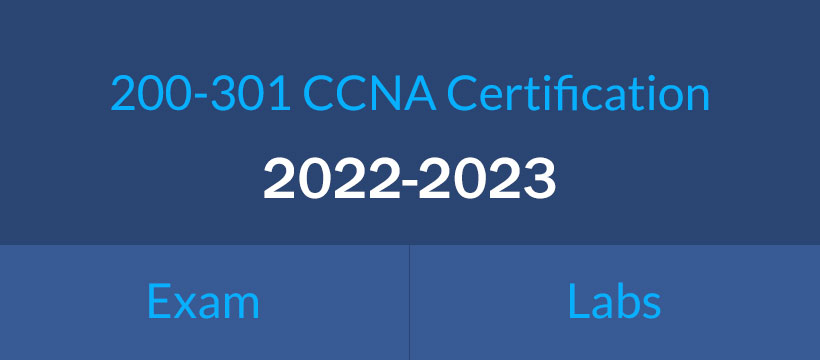
CCNA 200-301 dumps contain 1017 exam questions and answers covering actual CCNA 200-301 certification exams and labs to prepare for the 2022-2023 CCNA certification.
It is very important to choose the most trustworthy CCNA 200-301 certification materials. leads4pass has been an IT certification provider that really solves problems for candidates since 2004,
Use the CCNA 200-301 dumps provided by leads4pass: https://www.leads4pass.com/200-301.html, to prepare for the 2022-2023 CCNA certification exam.
Try a free CCNA 200-301 exam questions and answers online (Include Labs):
Question 1:
Refer to the exhibit. An engineer is configuring an EtherChannel using LACP between Switches 1 and 2. Which configuration must be applied so that only Switch 1 sends LACP initiation packets?

A. Switch 1 (config-if)#channel-group 1 mode on Swrtch2(config-if)#channel-group 1 mode passive
B. Switch1(config-if)#channel-group 1 mode passive Switch2(config-if)#channel-group 1 mode active
C. Switch1{config-if)#channel-group 1 mode active Switch2(config-if)#channel-group 1 mode passive
D. Switch1(config-if)#channel-group 1 mode on Switch2(config-if)#channel-group 1 mode active
Correct Answer: C
Question 2:
A wireless administrator has configured a WLAN; however, the clients need access to a less congested 5-GHz network for their voice quality. What action must be taken to meet the requirement?
A. enable AAA override
B. enable RX-SOP
C. enable DTIM
D. enable Band Select
Correct Answer: D
Question 3:
DRAG DROP Drag and drop the TCP/IP protocols from the left onto the transmission protocols on the right
Select and Place:

Correct Answer:
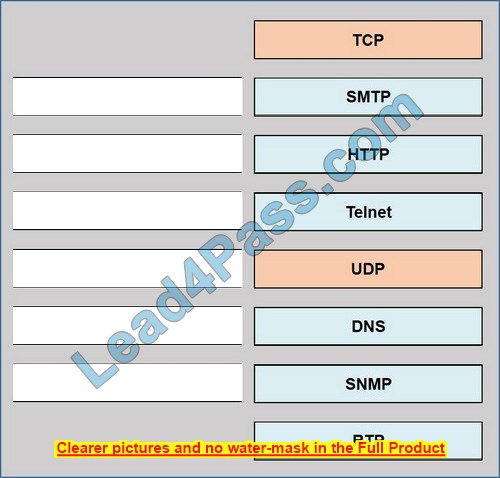
Question 4:
An engineer is configuring SSH version 2 exclusively on the R1 router. What is the minimum configuration required to permit remote management using the cryptographic protocol?
A. hostname R1 IP domain name cisco crypto key generate RSA general-keys modulus 1024
username cisco privilege 15 password 0 cisco123
IP ssh version 2
line vty 0 15
transport input ssh
login local
B. hostname R1 crypto key generate RSA general-keys modulus 1024 username cisco privilege 15 password 0 cisco123 IP ssh version 2 line vty 0 15 transport input all login local
C. hostname R1 service password-encryption crypto key generate RSA general-keys modulus 1024 username cisco privilege 15 password O cisco123 IP ssh version 2 line vty 0 15 transport input ssh login local
D. hostname R1 IP domain name cisco crypto key generate RSA general-keys modulus 1024 username cisco privilege 15 password 0 cisco123 IP ssh version 2 line vty 0 15 transport input all login local
Correct Answer: C
Question 5:
Drag and drop each broadcast IP address on the left to the Broadcast Address column on the right. Not all options are used.
Select and Place:

Correct Answer:
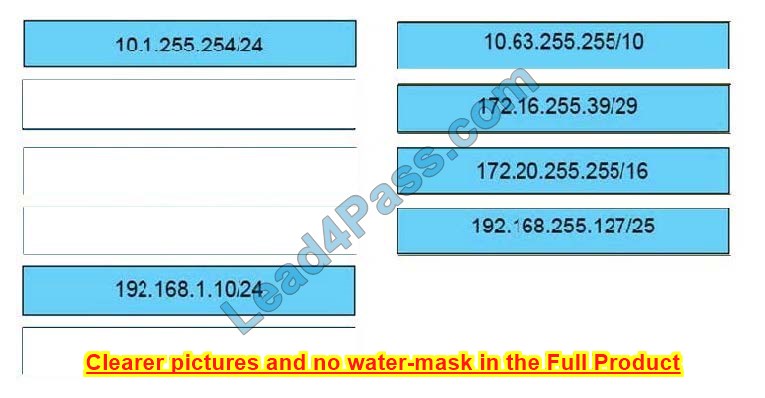
Question 6:
Which mode must be set for APs to communicate to a Wireless LAN Controller using the Control and Provisioning of Wireless Access Points (CAPWAP) protocol?
A. bridge
B. route
C. autonomous
D. lightweight
Correct Answer: D
Question 7:
What is the default behavior of a Layer 2 switch when a frame with an unknown destination MAC address is received?
A. The Layer 2 switch forwards the packet and adds the destination MAC address to its MAC address table.
B. The Layer 2 switch sends a copy of a packet to the CPU for destination MAC address learning.
C. The Layer 2 switch floods packets to all ports except the receiving port in the given VLAN.
D. The Layer 2 switch drops the received frame.
Correct Answer: C
If the destination MAC address is not in the CAM table (unknown destination MAC address), the switch sends the frame out to all other ports that are in the same VLAN as the received frame. This is called flooding. It does not flood the frame out of the same port on which the frame was received.
Question 8:
Refer to the exhibit. Which command would you use to configure a static route on Router1 to network 192.168.202.0/24 with a nondefault administrative distance?
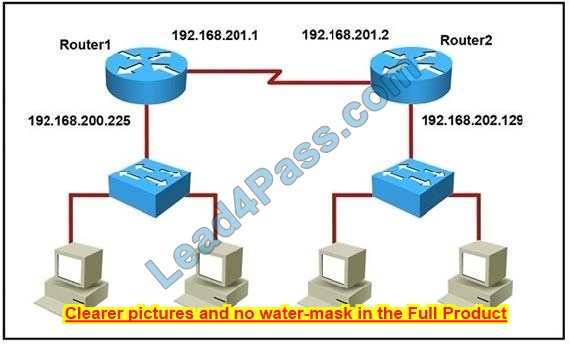
A. router1(config)#ip route 192.168.202.0 255.255.255.0 192.168.201.2 1
B. router1(config)#ip route 192.168.202.0 255.255.255.0 192.168.201.2 5
C. router1(config)#ip route 1 192.168.201.1 255.255.255.0 192.168.201.2
D. router1(config)#ip route 5 192.168.202.0 255.255.255.0 192.168.201.2
Correct Answer: B
The default AD of the static route is 1 so we need to configure another number for the static route.
Question 9:
What is the primary function of a Layer 3 device?
A. to analyze traffic and drop unauthorized traffic from the Internet
B. to transmit wireless traffic between hosts
C. to pass traffic between different networks
D. forward traffic within the same broadcast domain
Correct Answer: C
Question 10:
A network administrator must enable DHCP services between two sites. What must be configured for the router to pass DHCPDISCOVER messages onto the server?
A. a DHCP Relay Agent
B. DHCP Binding
C. a DHCP Pool
D. DHCP Snooping
Correct Answer: A
Question 11:
Which QoS queuing method discards or marks packets that exceed the desired bit rate of traffic flow?
A. shaping
B. policing
C. CBWFQ
D. LLQ
Correct Answer: B
Question 12:
Refer to the exhibit.
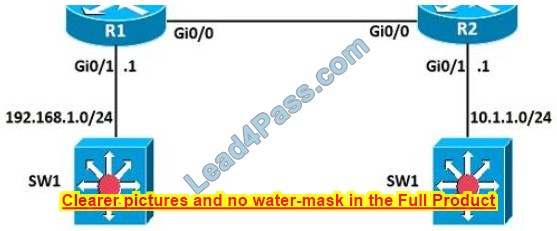
A network engineer is in the process of establishing IP connectivity between two sites. Routers R1 and R2 are partially configured with IP addressing. Both routers have the ability to access devices on their respective LANs. Which command set configures the IP connectivity between devices located on both LANs in each site?
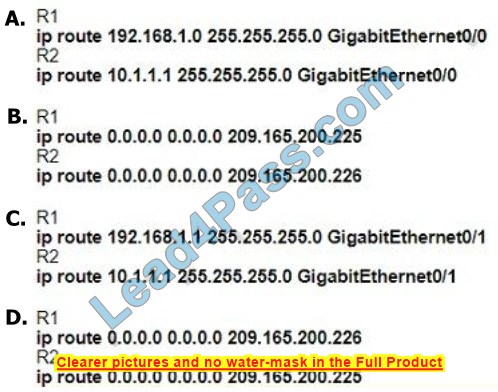
A. Option A
B. Option B
C. Option C
D. Option D
Correct Answer: D
Question 13:
Refer to the exhibit. An access list is required to permit traffic from any host on interface G0/0 and deny traffic from interface G/0/1. Which access list must be applied?
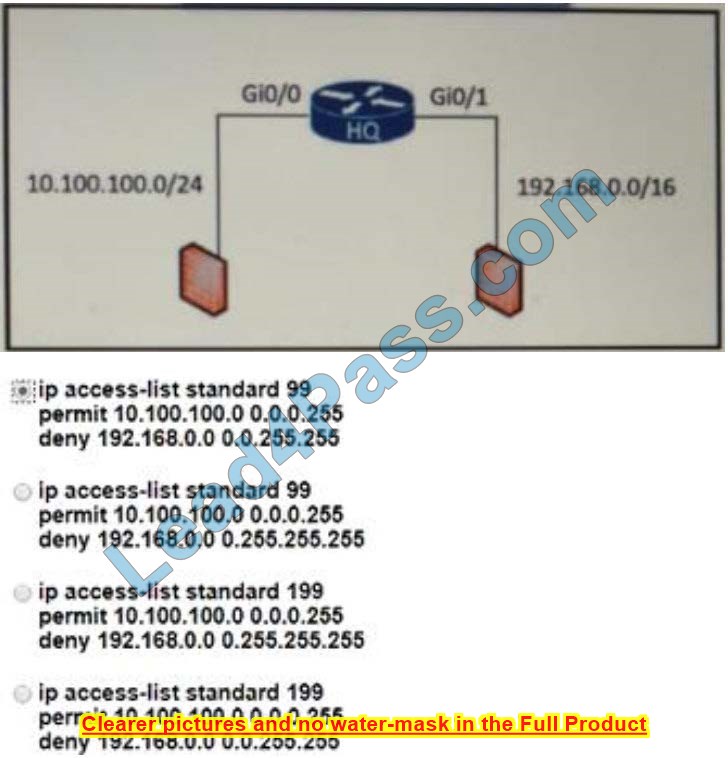
A. Option A
B. Option B
C. Option C
D. Option D
Correct Answer: A
Question 14:
What are network endpoints?
A. act as routers to connect a user to the service prowler network
B. a threat to the network if they are compromised
C. support inter-VLAN connectivity
D. enforce policies for campus-wide traffic going to the internet
Correct Answer: B
Question 15:
What are two reasons that cause late collisions to increment on an Ethernet interface? (Choose two.)
A. when Carrier Sense Multiple Access/Collision Detection is used
B. when one side of the connection is configured for half-duplex
C. when the sending device waits 15 seconds before sending the frame again
D. when a collision occurs after the 32nd byte of a frame has been transmitted
E. when the cable length limits are exceeded
Correct Answer: BE
A late collision is defined as any collision that occurs after the first 512 bits (or 64th bytes) of the frame have been transmitted. The usual possible causes are full-duplex/half-duplex mismatch, exceeded Ethernet cable length limits, or defective
hardware such as incorrect cabling, a non-compliant number of hubs in the network, or a bad NIC.
Late collisions should never occur in a properly designed Ethernet network. They usually occur when Ethernet cables are too long or when there are too many repeaters in the network.
Reference: https://www.cisco.com/en/US/docs/internetworking/troubleshooting/guide/tr1904.html
…
Total Questions: 1017 Q&A (Include Newest Simulation Labs)
leads4pass provides protection for candidates who are about to embark on the path of CCNA certification, using CCNA 200-301 dumps: https://www.leads4pass.com/200-301.html (Include Newest Simulation Labs), becoming 2022-2023 One of CCNA members, Help you get rid of current problems and enhance career value.